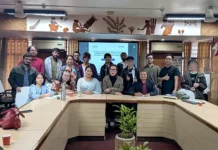Guwahati, Oct 17 (PTI) Tea Association of India (TAI) secretary general PK Bhattacharjee on Monday asserted that adherence to government laws by the tea industry, particularly in the social sector, is “exemplary” when compared to most other business sectors.
He also claimed that the tea industry has “aligned” itself well with central and state government schemes for women and children welfare, while also underlining the need for a nodal officer to ensure better implementation of such programmes.
Speaking at a programme — ‘Business and Child Rights in Tea Supply Chain’ — Bhattacharjee said the tea industry stopped engaging child and adolescent labour in the early nineties of the last century as a conscious decision, without any government pressure.
With women forming the major chunk of its workforce, the industry has been focussing on their welfare and, in the process, “got aligned with central and state governments schemes” for this section of population, he added.
“Adherence to laws in the tea industry vis- -vis most other industries is exemplary,” the tea planters’ body leader claimed.
Bhattacharjee also said that appointment of nodal officers to coordinate with tea gardens and workers for better implementation of the programmes is also necessary.
Dinesh Bihani, secretary, Guwahati Tea Auction Buyers’ Association, stressed that a vigil has to be maintained on the activities of children associated with the gardens, with special emphasis on school attendance.
“I suggest that the tea gardens maintain a list of children in their area and work with local NGOs in ensuring that these children get their education and do not go astray,” he added.
Dr Aditi Smith Gogoi, assistant professor at Assam Agricultural University, Jorhat, stressed that it is necessary to ensure that a percentage of the profit earned by selling tea is routed for the welfare of the workers.
Gogoi also emphasised the need for a code of ethical purchase, under which major buyers will make sure that they get their tea only from those producers who do not engage children for work.
Secretary of TAI, Guwahati, Dipanjol Deka, underscored that a concerted effort by all stakeholders can ensure that the industry remains economically viable.
Other speakers at the programme, which was jointly organised by TAI in association with NGO ‘Save the Children’, also noted that women and children at tea garden workers will be able to improve their standard of living when the benefits of welfare schemes reach them on time.

